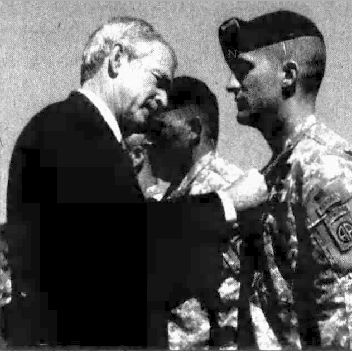|
AWARD OF THE
SILVER STAR MEDAL TO |
||
|
CITATION: The President of the United States of America, authorized by Act of Congress July 9, 1918 (amended by an act of July 25, 1963), takes pleasure in presenting the Silver Star to Sergeant First Class William Charles Tomlin, III, United States Army, for conspicuous gallantry and intrepidity in action against the enemy while serving with Headquarters and Headquarters Company, 1st Battalion, 508th Parachute Infantry Regiment, 82d Airborne Division, during combat operations in support of Operation ENDURING Freedom, on 9 April 2007, in Afghanistan. On that date, Sergeant First Class Tomlin distinguishing himself through acts of gallantry and intrepidity at the risk of his life in action against an enemy force which outnumbered his own by six-to-one. Near the town of Chakak, Helmand, Afghanistan, Sergeant First Class Tomlin was acting as the Scout Platoon Leader on the seventh day of intense independent combat operations during Operation FURIOUS PURSUIT, when the scout platoon encountered an enemy force who quickly attempted [to] envelope them by maneuver and combined arms operations, including mortars, accurate RPG fire, heavy weapons and AK-47s in a pitched battle that lasted six hours. During the engagement, Sergeant First Class Tomlin personally led several dismounted counterattacks against enemy forces that had closed to within 30 meters of his position. He simultaneously coordinated the effects of heavy mortars within 50 meters of his position, heavy weapons, and CAS within 150 meters of friendly troops. By using expert call for fire techniques, hand grenades and his own personal weapon, he was able to not only defend his position, but later organize the reinforcements of four separate units to destroy between 30 - 50 soldiers and kill two key Taliban leaders in the Sangin area. Sergeant First Class Tomlin's personal example and bravery under fire was the key component to turning a dire situation into a complete victory for the task force on this day. His exceptional bravery, example to his soldiers in the face of a dedicated Taliban force, and personal leadership has set the example for the 82d Airborne Division, and is in keeping with the highest tradition of military service. |
"I would say we were pretty lucky" SALUTING SGT-1ST CLASS WILLIAM C TOMLIN, III VALOR Selfless courage
at the moment of truth Sgt. 1st
Class William Tomlin III was exhausted and severely dehydrated. Up against
an enemy force of 300, the 45 soldiers of his scout platoon had been
battling for nearly six hours in temperatures reaching almost 120 degrees
near the village of Chakak, Afghanistan. [Hawaii Tribune-Herald, Hilo, HI, 28 Dec 2009, Mon, Page 5] |
ABOUT TOMLIN Born Nov. 23, 1976, in New Britain, Conn. Now lives in West Point, N.Y. Joined the Army on May 25, 1998, and was assigned to Headquarters Company, 1st Battalion, 508th Parachute Infantry Regiment, 4th Brigade Combat Team. Has served four tours of duty overseas, two each in Iraq and Afghanistan. WHAT HE DID
WHERE HE IS NOW
WHY HE JOINED THE ARMY "I first came on active duty in 1998. I had been simultaneously going to college and serving in the National Guard to help pay for college. When I was getting ready to graduate, I didn't really feel like I was ready to join corporate America yet, so I decided to join the active-duty Army. I told myself it would just be for three years, just to go for a little bit of fun and adventure, and it turned out that I really liked it, so I decided to stick around for a while." |













